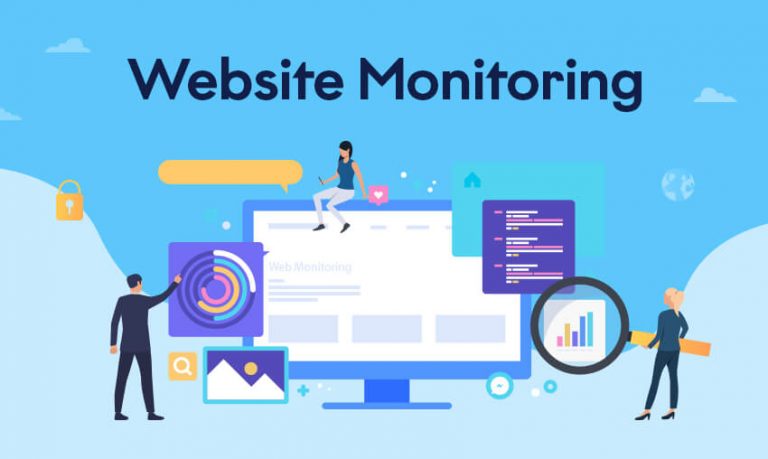Even if you’re sitting nice and pretty basking in the glory of a 99% uptime rate for your business website; it still means that your website is experiencing downtime for 3.65 days every year. Doesn’t sound pretty anymore, does it?
What if these days coincide with a mega festival promotion you have been preparing for? Like a Black Friday weekend? This facet has the potential to cost you a generous amount, not just from potential new leads but your existing customers as well.
What Is Website Monitoring?
As every WordPress development firm will tell you, website monitoring refers to that service type that tests, confirm, and keeps a check on how end users are interacting with the multiple layers and features of your website. This is predominantly a no-brainer for e-commerce websites, wherein every second is a deal maker/breaker in sales terms. As ensuring smooth transactions becomes a real-time affair.
Not just this, website monitoring can fine-tune and optimizes the business as a whole by providing key insights and business-critical data, which can help marketing managers and analysts strategize, come up with campaigns and connect with the demographics better.

See How Our Experts Can Drive More Traffic to Your Website!
SEO: Boost your rankings and drive more organic traffic today!
Website Design/Development: Create a stunning website that converts visitors into customers.
Paid Media: Reach the right audience at the right time with expertly managed paid media.
Putting things into a Clearer Perspective:
An a. If you have a slow website and your UI isn’t exactly top notch for the average user, Google will downgrade, if not, penalize your search rankings.
b. Most of the top industries and businesses (over 90%) online gather customers starting with a simple online search. This should put your website performance at the top of your priority list.
The agenda is crystal clear at the end of the day: if your website cannot be found because it is down or is slow; you are not just losing business in real-time, but you are losing brand credibility by the second. First impressions can’t be made twice now, can they?
As per a recent market study, 99% of the uptime user experiences online suffer a downtime/breakdown for no less than 7 hours every month. And it is ironic to find that most website monitoring services out there struggle to meet the 99% measure day in and day out.
This is why website monitoring is the need of the hour and should be considered as important as customized Magento ecommerce development for your brand.
Don’t Cheap Out When it Comes to Website Monitoring
Often to save costs, companies tend to extend this service to their web developers or product development agencies, without considering the depth and importance of this service. Just like you wouldn’t want a graphic designer to lead your online marketing strategy, in the same way, consult only the professionals when you decide to take the website monitoring plunge.
It is not rocket science for web developers to execute troubleshooting, run performance diagnostics, and do basic housekeeping, but it would never come close to the intricacy and the gravity of a professional website monitoring service 24×7
The Need for Website Monitoring
Slowly but surely, websites and online data as a whole are getting susceptible to malware attacks, viruses, phishing attempts, leaks, and hacks. And the probability only rises when the business grows. Hence, it is about ‘damage limitation’ before the damage occurs, as attacks are inevitable come what may.
Another aspect is that end users are relying more and more on websites submitting payment-critical data, business information, personal credentials, passwords, and whatnot. Hence, it has become even more imperative for businesses to cater to this need not just for the betterment of their product, but to ensure a high safety quotient for the average end user.
Here’s a detailed list of why website monitoring is a buzzword these days:
1. Get Instant Alerts When Your Site Goes Offline
Try to emphasize on the ‘when’ part and not ‘if’. As we discussed before, experiencing downtime is a forgone conclusion. In such a case, wouldn’t you want to be notified that something is wrong before your customers do? Just to clarify, even tech giants like Google don’t project a 100% uptime.
The reasons for this may vary, including the likes of a sudden burst of traffic, viruses, malware, hosting issues, plug-in compatibility, and more. The key metric is not just how you act but how fast you act.
This is where website monitoring ticks all the right buttons, by keeping tabs on the website performance 24×7, 365 days a year.
2. Focus on What’s Important
So you’ve spent big on ecommerce web design services and a professional SEO agency, and you decide to cut funds elsewhere by undertaking the monitoring aspect yourself. This will not just cut into your energy but it won’t allow you to focus on the more important business/brand aspects.
In no way, shape, or form will you be able to keep tabs 24×7, as we’re not machines. Checking the website status periodically just won’t cut it, as attacks don’t come with warnings.
Hence, save time, energy and keep your peace of mind intact, and employ a comprehensive website monitoring solution, giving yourself one less thing to worry about.
3. Customer Acquisition Cost Dissection
This is the beauty of in-depth analytics that comes from website monitoring. Allowing you to focus on the little details, will help dissect to the T the ‘what’, ‘why’, and ‘how’ of customer acquisition.
Once the average CAC is clear, you can then make strategic decisions and plan your marketing campaigns accordingly knowing what’s going out and coming in.
4. Be In Control
If you have your website monitored via website monitoring software, you will get to know on a real-time basis how it is performing, which gives you the buffer to inform your loyal customers through social media and other digital channels that there is a problem and you’re fixing it. As not all bugs can be fixed right away.
This not only ensures transparency but maintains a healthy rapport with the end user. Honest is the best policy, as they say!
5. Inducing Brand Credibility
This is kind of a no-brainer. Downtime once or twice in a few months is fine, but regularly, it can derail your brand image for good. And given the cutthroat competition; once lost, it is hard to get it back.
Customers are impressionable and it won’t even take seconds for them to shift their loyalty to a fellow brand, during your downtime. Constant monitoring is the only remedy to this situation.
6. Safeguard Your Sales Chart
E-commerce websites can generate profits in billions annually, which means that their numbers come down to thousands of dollars in profits per minute. It’s all about the math!
Every second lost isn’t just a loss in terms of direct sales, but you’re losing out on the customer for the long term.
7. Website Stability Tracking Over Time
How often does your website experience downtime? Does the sale period have any impact on the website speed given the traffic increases? Are there certain common triggers that lead to downtime? Without constant website monitoring, there is no way for you to know these answers.
Over time, this will help you get a clear measure of how your website performs in a variety of conditions and especially under traffic duress. You will be able to track the effectiveness of new plug-ins and integrations in terms of their effect on website performance and speed.
This will help you create a system where the performance charts keep rising.
8. SEO Boost
Google hates downtime. Period!
The overall performance, speed, and UI of your website directly affect search engine results. Ensuring you always stay in their good books, website monitoring is imperative. That’s a good enough reason by itself!
9. Miscellaneous:
a. It will help you detect hackers sooner rather than later.
b. Using monitoring, you can track your website speed in detail.
c. It will assist you to keep your hosting company on its toes.
When was the last time you used your health insurance? Website monitoring is the same; you hope you don’t have to use it but it is a mandatory asset in your repertoire. When the need arises, it can make or break your business in ways more than one.






